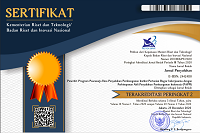Tingkat Partisipasi dalam Kegiatan Pendidikan Kecakapan Hidup
Abstract
Life skill education is an essential thing that must be owned by people to gain knowledge and practical skill in particular work fields. The success of life skill education was determined by the direct involvement of the society based on the planning, implementation, evaluation, and benefit of the result. The society would have involved in an activity if it was appropriate with the necessity, the interest, the aptitude, and the availability and the continuity of the source so that the society can apply the skill and the knowledge which are required for themselves and are useful for teaching the local society. The participation of the society was influenced by age, level of formal and informal education, attitude toward life skills, level of knowledge of life skills, functional skills, previous experience about life skills, the guidance of facilitators, and also the availability of supported facilities. According to Arstein, the participation of the society included in tokenism group which is the involvement due to the push in order to make them agree, the announcement of the same direction, the advice from the society is accepted but anyhow it became useless. The degree of the participation from the society gives much effect toward the success of life skill education in attitude change related to personal skill and academic skill. The attitude is also seen in social and vocational skills.
Keywords: the level participation, life skill
Downloads
Authors who publish with this journal agree to the following terms:
- Authors retain copyright and grant the journal right of first publication with the work simultaneously licensed under a

This work is licensed under a Creative Commons Attribution 4.0 International License that allows others to share the work with an acknowledgement of the work's authorship and initial publication in this journal. - Authors are able to enter into separate, additional contractual arrangements for the non-exclusive distribution of the journal's published version of the work (e.g., post it to an institutional repository or publish it in a book), with an acknowledgement of its initial publication in this journal.
- Authors are permitted and encouraged to post their work online (e.g., in institutional repositories or on their website) prior to and during the submission process, as it can lead to productive exchanges, as well as earlier and greater citation of published work (See The Effect of Open Access).















